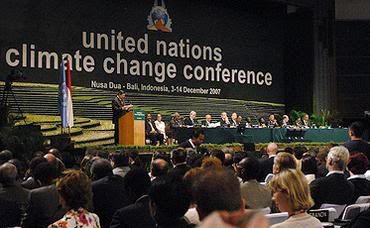100 Scientists Attack IPCC, Bali
 The Warmie bureaucrats are boarding their jetliners by the hundreds and flying home frm Bali, their carbon footprints trailing behind them like so many size 14s.
The Warmie bureaucrats are boarding their jetliners by the hundreds and flying home frm Bali, their carbon footprints trailing behind them like so many size 14s.Behind them, mounds of paper spell out the paths the UN negotiations will follow as they lead to a replacement for the soon-defunct Kyoto treaty. Basically the US won, knocking off an EU proposal to hit specific greenhouse gas reductions by 25 to 40 percent by 2040.
In the global media's haste to cover these shenanigans left largely uncovered was a letter from 100 scientists to UN Sec Gen Ban Ki-Moon that calls the UN's effort to prevent global climate change "futile" and "a tragic misallocation of resources that would be better spent on humanity's real and pressing problems."
The letter accuses UN policy-makers of buy-in to a political, not a scientific, thesis:
The IPCC Summaries for Policy Makers are the most widely read IPCC reports amongst politicians and non-scientists and are the basis for most climate change policy formulation. Yet these Summaries are prepared by a relatively small core writing team with the final drafts approved line-by-line by government representatives. The great majority of IPCC contributors and reviewers, and the tens of thousands of other scientists who are qualified to comment on these matters, are not involved in the preparation of these documents. The summaries therefore cannot properly be represented as a consensus view among experts. (emphasis added)Signatories make these points about these fallacies of the current UN global warming group-think:
Recent observations of phenomena such as glacial retreats, sea-level rise and the migration of temperature-sensitive species are not evidence for abnormal climate change, for none of these changes has been shown to lie outside the bounds of known natural variability.
The average rate of warming of 0.1 to 0. 2 degrees Celsius per decade recorded by satellites during the late 20th century falls within known natural rates of warming and cooling over the last 10,000 years.
Leading scientists, including some senior IPCC representatives, acknowledge that today's computer models cannot predict climate. Consistent with this, and despite computer projections of temperature rises, there has been no net global warming since 1998. That the current temperature plateau follows a late 20th-century period of warming is consistent with the continuation today of natural multi-decadal or millennial climate cycling.
hat-tip: Greenie Watch
Labels: Bali, Climate change, Global warming, U.N.




<< Home